

Writing. Writing, Creativity, Quotes. WRITING. In Defense of Autobiography. When author Pauls Toutonghi set out to write his first book, he made himself a promise: he would not be another stereotype of “the debut novelist writing about his life.”
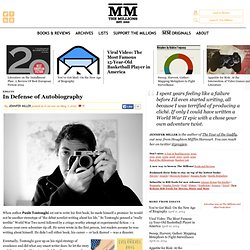
So Toutonghi penned a “really terrible” World War Two novel followed by a cringe-worthy attempt at experimental fiction — a choose-your-own-adventure rip off. He never wrote in the first person, lest readers assume he was writing about himself. He didn’t sell either book; his career — or lack thereof — was a disaster. Eventually, Toutonghi gave up on his rigid strategy of avoidance and did what any smart writer does: he let the story and characters lead him, instead of the other way around. Toutonghi is half Latvian, half Egyptian and was raised in the U.S. But if you talk to writers who have taken the autobiographical plunge, you’ll hear an almost universal relief — that writing about yourself allows you to follow your best instincts. So where does this fear come from? And the transformation is key. Saul Bellow 'How I Wrote Augie March's Story' 1954.
Does anyone know where to find good writing prompts? - writing writingprompts. Thirteen Writing Prompts. [Originally published May 4, 2006.]
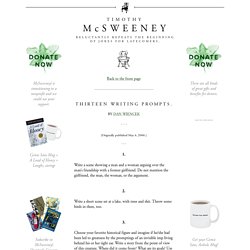
Write a scene showing a man and a woman arguing over the man’s friendship with a former girlfriend. Do not mention the girlfriend, the man, the woman, or the argument. Write a short scene set at a lake, with trees and shit. Throw some birds in there, too. Choose your favorite historical figure and imagine if he/she had been led to greatness by the promptings of an invisible imp living behind his or her right ear. Write a story that ends with the following sentence: Debra brushed the sand from her blouse, took a last, wistful look at the now putrefying horse, and stepped into the hot-air balloon. A wasp called the tarantula hawk reproduces by paralyzing tarantulas and laying its eggs into their bodies. Imagine if your favorite character from 19th-century fiction had been born without thumbs. One Sentence - True stories, told in one sentence. Writing Assignments.
Words I Never Want to See in Your Novel. Please. BlaBlaMeter - Bullshit detection tool. Cliche Finder. In Praise of Concision. Some guy on TV is describing how he fitted his automobile with a new skin: gluing them one by one, he has blanketed every inch of its exterior with beer-bottle caps.
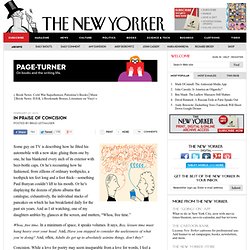
Or he’s recounting how he fashioned, from zillions of ordinary toothpicks, a toothpick ten feet long and a foot thick—something Paul Bunyan couldn’t lift to his mouth. Or he’s displaying the dozens of photo albums that catalogue, exhaustively, the individual stacks of pancakes on which he has breakfasted daily for the past six years. And as I sit watching, one of my daughters ambles by, glances at the screen, and mutters, “Whoa, free time.” Whoa, free time. In a minimum of space, it speaks volumes. Concision. 5 situations where it's better to tell than show in your fiction. @ceti: BAH!
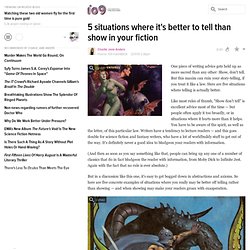
Curse you both! This is a ploy with my co-worker, who only mentioned that I need to take this book from my shelf, dust it off, and read it already. You're all my Jiminy Crickets...Resolution #1 decided. Writing. Eight Secrets Which Writers Won’t Tell You. Image from Flickr by Lazurite This is not particularly relevant to the post, but I’m getting an awful lot of comments telling me, often a little snarkily, “it’s ‘THAT’ not ‘WHICH’”.

The “don’t use which for restrictive clauses” rule comes (as far as I can tell) from Strunk and White. The Interactive Fiction Renaissance: The Weblog Roundtable. A reprint from the March 2013 issue of Gamasutra's sister publication Game Developer magazine, this article explores the world of cutting-edge interactive fiction.
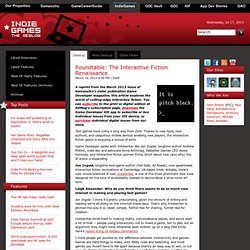
You can subscribe to the print or digital edition at GDMag's subscription page, download the Game Developer iOS app to subscribe or buy individual issues from your iOS device, or purchase individual digital issues from our store. Text games have come a long way from Zork. Thanks to new tools, new authors, and ubiquitous mobile devices enabling new players, the interactive fiction genre is enjoying a revival of sorts. Game Developer spoke with Inklewriter dev Jon Ingold, longtime author Andrew Plotkin, indie dev and advocate Anna Anthropy, Failbetter Games CEO Alexis Kennedy, and interactive-fiction pioneer Emily Short about how (and why) the IF scene is expanding. Jon Ingold, longtime text-game author (Fail-Safe, All Roads), now spearheads interactive fiction innovations at Cambridge, UK-based Inkle. AP: Oh, geez.
Community. Writing Conferences - Creative Writing Workshops, Conferences, Retreats, Festivals. Writing Conferences & Festivals A guide to writing conferences, writing workshops, writing retreats, writing centers, residencies, symposiums, plus book & literary festivals Conference Classifieds Sponsored Conferences - Complete Conference List.

LitReactor. Some thoughts and musings about making things for the web. Viktor Shklovsky wants to make you a better writer, part 1: device & defamiliarization. When I was finishing up my Master’s degree at ISU, I worried that I still didn’t know much about writing—like, how to actually do it.

My mentor Curtis White told me, “Just read Viktor Shklovsky; it’s all in there.” So I moved to Thailand and spent the next two years poring over Theory of Prose. When I returned to the US in the summer of 2005, I sat down and started really writing. I’ve already put up one post about what, specifically I learned from Theory of Prose, but it occurs to me now that I can be even more specific. So this will be the first in a series of posts in which I try to boil ToP down into a kind of “notes on craft,” as well as reiterate some of the more theoretical arguments that I’ve been making both here and at Big Other over the past 2+ years.
Let’s talk first about where Viktor Shklovsky himself started: the concepts of device and defamiliarization. Theory of Prose was originally published in 1925, but not published in English until 1991. OK. The Age of the Essay. September 2004 Remember the essays you had to write in high school?
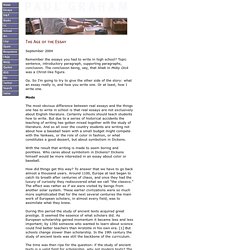
Topic sentence, introductory paragraph, supporting paragraphs, conclusion. The conclusion being, say, that Ahab in Moby Dick was a Christ-like figure. Oy. So I'm going to try to give the other side of the story: what an essay really is, and how you write one. Mods The most obvious difference between real essays and the things one has to write in school is that real essays are not exclusively about English literature. With the result that writing is made to seem boring and pointless. Kerouac on technique. Jack Kerouac 1.
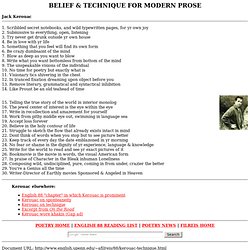
Scribbled secret notebooks, and wild typewritten pages, for yr own joy 2. Submissive to everything, open, listening 3. Try never get drunk outside yr own house 4. Be in love with yr life 5. 15. Freud on Creative Writing and Daydreaming. Jeffrey Eugenides's Advice to Young Writers. The following text is adapted from a speech given to the 2012 Whiting Award winners. In his 1988 book of essays, “Prepared for the Worst,” Christopher Hitchens recalled a bit of advice given to him by the South African Nobel Laureate Nadine Gordimer.
The Art of Criticism No. 1, Harold Bloom. Recently, Harold Bloom has been under attack not just in scholarly journals and colloquia, but also in newspapers, on the op-ed page, on television and radio. The barrage is due to the best-seller The Book of J, in which Bloom argues that the J-Writer, the putative first author of the Hebrew Bible, not only existed (a matter under debate among Bible historians for the last century) but, quite specifically, was a woman who belonged to the Solomonic elite and wrote during the reign of Rehoboam of Judah in competition with the Court Historian. The attacks have come from Bible scholars, rabbis, and journalists, as well as from the usual academic sources, and Bloom has never been more isolated in his views or more secure in them.
He has become, by his own description, “a tired, sad, humane old creature,” who greets his many friends and detractors with an endearing, melancholy exuberance. What are your memories of growing up? That was such a long time ago. Almost none. What can Diane Arbus teach you about writing? I always thought of photography as a naughty thing to do - that was one of my favorite things about it, and when I first did it, I felt very perverse. -- Diane Arbus Diane Arbus (1923-1971) was an American photographer and a student of human diversity, often described as a "photographer of freaks. " Maybe one should admit that freakishness comes from within and 'normal' is a mirage.
How to Write Great. And yet, at the end of the day — our own or days in general — what else do we seek from our books? The verities need not be expressed gently, unambiguously or in rhyming couplets, but it is the verities that make us know ourselves. 36 Writing Essays by Chuck Palahniuk. 1: Establishing Your Authority Chuck teaches two principal methods for building a narrative voice your readers will believe in. Discover the Heart Method and the Head Method and how to employ each to greatest effect. Colson Whitehead’s Rules for Writing. Rule No. 1: Show and Tell. McSweeney&s Internet Tendency: The Ultimate Guide to Writing Better Than You Normally Do.
Writing is a muscle. Pixar’s 22 Rules of Storytelling « Aerogramme Writers' Studio. These rules were originally tweeted by Emma Coats, Pixar’s Story Artist. Number 9 on the list – When you’re stuck, make a list of what wouldn’t happen next – is a great one and can apply to writers in all genres. You admire a character for trying more than for their successes.You gotta keep in mind what’s interesting to you as an audience, not what’s fun to do as a writer.
They can be very different.Trying for theme is important, but you won’t see what the story is actually about til you’re at the end of it. Now rewrite.Once upon a time there was ___.